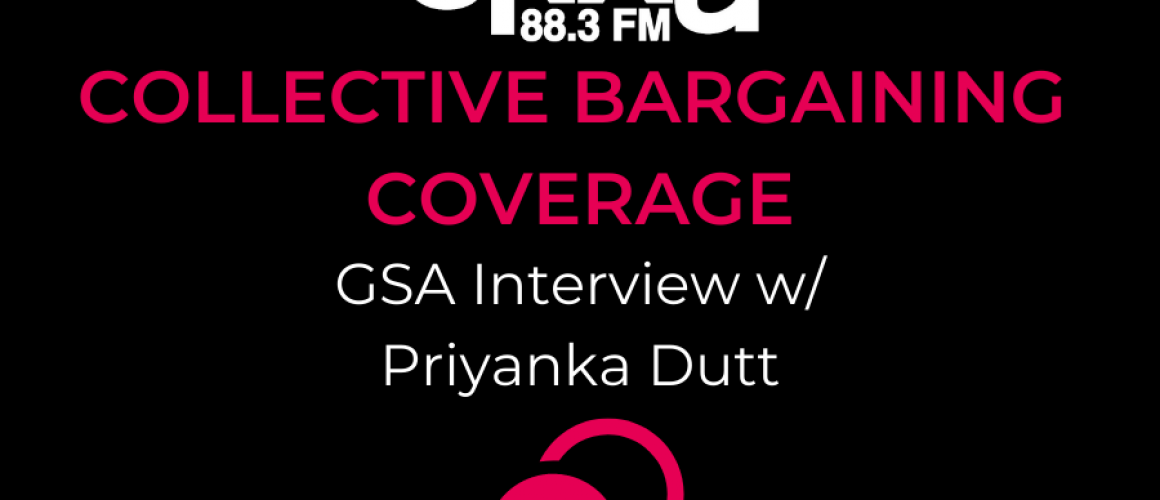GSA Interview w/ Priyanka Dutt
Posted February 9, 2022 at 5:05pm
Interviewee: Priyanka Dutt, GSA Council President
Interviewer: Michael Doherty, CKXU Program Director
Transcribed by Genna Bourchier
Interview Transcript
Michael Doherty (MD): This is Michael Doherty for CKXU as part of our coverage of the Collective Bargaining here at the University of Lethbridge. I’m here today with:
Priyanka Dutt (PD): Priy, from the GSA.
MD: What is the GSA?
PD: The GSA is the Graduate Students’ Association here at the University of Lethbridge.
MD: What is the GSA’s purpose in regards to the University?
PD: The GSA is our bridge between students and the institution. It’s our avenue to make sure that student concerns and voices are heard.
MD: What is your organization’s mission and values?
PD: We have three pillars in terms of our strategic plan and our mission statement. We focus on engagement, sustainability, and advocacy. We are trying to make sure that the GSA is a sustainable organization so that graduate students are always represented. We try to ensure that there is active engagement between the GSA council, the students, as well as the institution. And then of course, advocacy being a major part we have representatives on multiple facets of governance here at the University, and that’s our way of making sure that students are heard.
MD: How are you upholding your organization’s mission statement during this time?
PD: We recognize that this is a very difficult time, very stressful. Our main way of upholding our values so far is by keeping open lines of communication for our students. Students have my email and they can contact me directly with any questions. We are also constantly and consistently making sure that any and all concerns from the students are being heard by our University, as well as ULFA and other representative groups on campus.
MD: What is your organization’s intended outcomes and goals for the current Collective Bargaining situation?
PD: Come out unscathed, as much as possible. We’re trying to make sure that students are informed as things unfold, as the Bargaining process unfolds. We’re trying to make sure that should a strike happen that students are supported and have the resources necessary as we navigate that.
MD: What, if any, services does your organization provide that will or could be impacted by the current situation?
PD: There is a good chance that the GSA services and resources will not be interrupted, so we foresee that our awards and whatnot will continue being accessible by students.
MD: You mentioned earlier contact via email, but additionally how can students and campus members get in touch with a representative from your organization?
PD: There are two main ways to do so – one is through our main or general email account, so students can email us at [email protected] and that way they can contact any council representative that they feel necessary. They can also contact me directly at [email protected]
MD: What is you and your organization’s general position on the current Collective Bargaining situation?
PD: The GSA Council did hold a vote, and we did see a unanimous vote in favor of supporting ULFA. We also surveyed our members and we saw the vast majority also wanting to stand in solidarity with faculty. Currently our position is that we stand with ULFA.
MD: How are you supporting the mental health of your members and the community that you serve during this time?
PD: To the best of our ability! Like I said earlier, it’s a difficult time and stress is running rampant. Like I said, students are more than welcome to reach out to me directly. I’ve had a number of students reach out and express some of their concerns and as always, the GSA will do our best to make sure that the proper channels, resources, and supports are put in place. Going forward we are working in tandem with ULFA, as well as SGS, and Dean Jackie Rice to ensure students have all the answers necessary as we navigate this.
MD: What are your thoughts on funding for post-secondary education, and as a follow-up what can campus members do to show their support for post-secondary education?
PD: Sadly, there’s not enough funding for post-secondary education, and it’s kind of unfortunate. I’m sure as everyone knows, to ensure that we have a bright future you need to invest in your future and that includes investing in post-secondary. It’s unfortunate to see that we don’t have that funding. Sadly, I don’t know how things are going to go in the future. But in terms of students supporting post-secondary education and what they can do – you can contact our Chair of the Graduate Students’ Labour Relations Board, Jackson Hamm, at [email protected] and I’m sure that he has signs and whatnot that you can absolutely grab and keep at your homes. Also, students are more than welcome to join ULFA at the picket lines. While this is a Faculty strike, this also speaks to the condition of post-secondary learning and the environments that we are both teaching and learning in, so that support is definitely welcome.
MD: In addition to the email address you just provided us with, do you have any links or websites with additional information that you would like us to post on our website?
PD: Oh, absolutely. Students are more than welcome to visit our website www.ulgsa.org – we have links to updates from ULFA, as well as our own FAQ, a statement of solidarity available, and letters that other departments from the University have requested to host there.
MD: If there is a picket line or building on campus that is inaccessible, what should a person do if they are a University of Lethbridge student or staff member, community member accessing services, or a 3rd party organization or business?
PD: In regards to students specifically, if you are having any trouble at the picket lines please, please email myself or Jackson. We have been told by ULFA that students can contact the captain at the picket lines and there shouldn’t be any problems thereafter. That being said, you are more than welcome to contact us and we can get that problem or situation resolved for you immediately.
MD: In what ways do you feel that this situation could impact the remainder of the Spring semester?
PD: I’m really hoping it doesn’t, but there is a possibility that things will be further delayed. In terms of research programs for graduate students, as long as you are part of a self-sufficient lab then you can largely continue your responsibilities. Those in core space programs, you might see a delay in your course. Further to that, you will have to discuss with your professors or supervisors what that might look like. Unfortunately, it’s kind of a case by case basis for grad studies, there isn’t really an overarching answer I can provide.
MD: And what steps can be taken following this situation’s resolution to promote on-campus unity?
PD: Like I said earlier, our teaching conditions are also our learning conditions. Part of the reason we want to support our Faculty is the idea that those conditions work in tandem and they relate to each other. So moving forward, we encourage our students to maintain those healthy relationships with Faculty. Graduate students constantly work closely with Faculty and so ensuring that we have that level of support between our relationships will be one really great way to promote campus unity. I think it’s also important to remember that at the heart of all of this, is the fact that there isn’t post-secondary education funding and that there has been a lack of emphasis placed on what education means. We have to remember that it’s not just a campus isolated event – this is something that would affect the province largely.
MD: In addition to what you just stated, does your organization have a plan to support its members and the community you serve as we eventually transition out of this situation?
PD: Eventually. Like I said, we’re making sure that we have as much up-to-date information from ULFA, the School of Graduate Studies, and Dean Jackie Rice and any other members on campus that we’ll still have access to. That being said, in terms of transitioning back, again this is going to be kind of difficult. There are graduate thesis defenses that will have to be delayed, or other thesis work that will have to be delayed. Really it’s about making sure we have the supports in place and ensuring that students know they can access the GSA, who will advocate for students if you need an academic appeal or if there are extenuating circumstances that you feel you aren’t being heard in, the GSA is available for you.
MD: As we wrap up, do you have any points that you would like to expand upon from earlier or any additional statements that you would like to make?
PD: Stop post-secondary education cuts.
Please contact [email protected] with any omissions or errors in our transcription.

